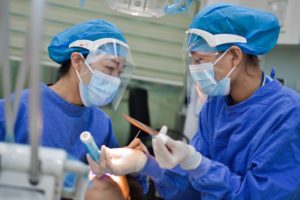In the case of a viral infection, the body’s first protective action is a non-specific innate response, where macrophages, neutrophils, and dendritic cells slow the progress of the pathogen and may even prevent any symptoms from occurring. The next protective action is an adaptive response (cellular immunity), with the body making specific antibodies (immunoglobulins) against the virus, as also T-cells that eliminate other virus-infected cells. Not only does adaptive response clear the virus from the body, if strong enough, it could prevent progression to severe illness or re-infection by the virus. This multi-step process in the development of natural immunity generally takes around one to two weeks, and is usually measured by the presence of antibodies in blood.
While for some viruses the first infection can provide lifelong immunity, for seasonal coronaviruses, protective immunity is short-lived, according to some researchers. In the case of COVID-19, one of the key questions in predicting the course of the pandemic is how well and how long the immune responses offer protection from re-infection. According to the World Health Organization, which has been reviewing the evidence on antibody responses to SARS-CoV-2, studies show that people who have recovered have antibodies to the virus. At the same time, it reports that, “some have shown very low levels of neutralizing antibodies in their blood, suggesting that cellular immunity may also be critical for recovery.”
Here is what its scientific brief, dated April 20, 2020, says: “There is currently no evidence that people who have recovered from COVID-19 and have antibodies are protected from a second infection”. This should be considered by those governments who believe that the detection of antibodies to SARS-CoV-2 could serve as the basis for an “immunity passport” or “risk-free certificate” that enables people to travel and go to work.
In a study published in The Lancet Infectious Diseases, researchers in the United States found that a COVID-19 patient (with no immune disorders) who recovered and tested negative by RT-PCR at two consecutive time points, again tested positive 48 days after the initial test. However, while the genome sequences of isolates from the first infection and re-infection were very different (meaning that the virus could be from different infections), they discovered that re-infection resulted in worse disease (requiring oxygen support and hospitalization) than in the case of the first infection.
The researchers ask: do re-infections occur because of a scant antibody response after the first infection? Does immunity protect an individual from disease on re-infection? Similarly, does immunity prevent transmission from those who are re-infected? Another question is: why is the disease milder in some re-infections, while others are more severe? And also, are different vaccines needed for infection by different viral isolates? At the same time, they say that: “There is currently no evidence that a SARS-CoV-2 variant has emerged as a result of immune evasion. For now, one vaccine will be sufficient to confer protection against all circulating variants.”
Due to lack of enough data, it is still not known how frequently re-infection occurs among those who recovered from their first infection. Furthermore, the re-infection cases discovered so far imply that immunity acquired by natural infection cannot be relied on to confer herd immunity, which makes the researchers conclude that, “herd immunity requires safe and effective vaccines and robust vaccination implementation”.

Dr. Shahid Jameel, a virologist and the director of Trivedi School of Biosciences, Ashoka University, in an interview with Scroll.in (Nov 6, 2020, https://bit.ly/38iO8nA), points out that, in cases of re-infection, it is important to know whether it is the same virus or infection via another viral event. He explains, “Viruses, as they multiply in people, acquire small mutations. So, it is highly unlikely that a case of re-infection will have exactly the same virus, that it will have exactly the same sequence, around 30,000 nucleotides.”
In the first case of COVID-19 re-infection discovered, in August 2019 in a Hong Kong resident, the virus in the re-infection had a slightly different sequence from the virus in the first infection. He states that although analyzing the genome sequence of the two specimens is the only credible way to determine a genuine case of re-infection, sequencing requires a special set up different from a diagnostic lab or hospital setting.
However, he opines: “People should not really be running to get their virus sequenced. That just creates unnecessary pressure on the system. I mean, what is at stake here? It is really theoretical whether somebody got infected again or not. What people are missing is that the key thing is disease.” Elaborating further, he adds, “We keep getting infected with many viruses we don’t even know of because they don’t manifest as disease. All this scare about re-infection is premature. The other thing is, today in the world there are over 25 million cases, and there are these isolated cases of so-called re-infection. It has no significance, essentially.”
The virologist also explains that in a case where a person who seemingly recovered, after weeks or months, and then tested positive again, it could be that, “what you may be detecting (in the test) is not a viable virus but viral nucleic acid.” The RT-PCR test cannot distinguish whether a sample contains a viable virus that is capable of infecting others, or whether it simply contains fragments of viral genetic material without a viable virus (genomic fragments). To the question of whether cases of re-infection could have a bearing on the effectiveness of potential vaccines, his reply is succinct: “No. Even as the COVID-19 caseload worldwide has crossed 27 million, cases of re-infection are extremely rare.”
References:
1. WHO, “Immunity passports” in the context of COVID-19”, April 20, 2020,
2.The Lancet, “What reinfections mean for COVID-19”, Akiko Iwasaki, October 12, 2020,
3. Scroll.in, “What are the chances of re-infection after recovery from Covid-19?” Nov 8, 2020,
 Medicosnext
Medicosnext




